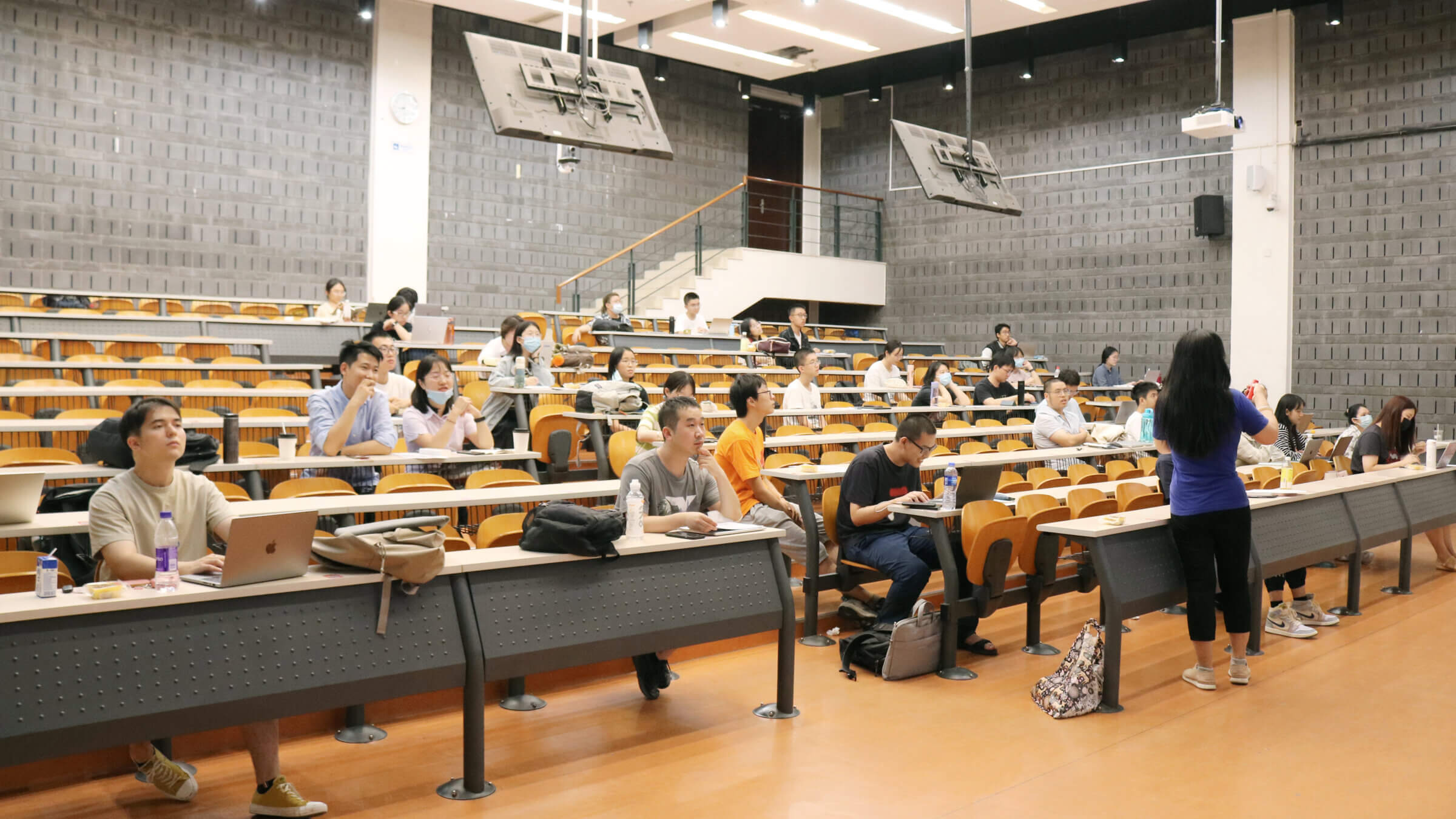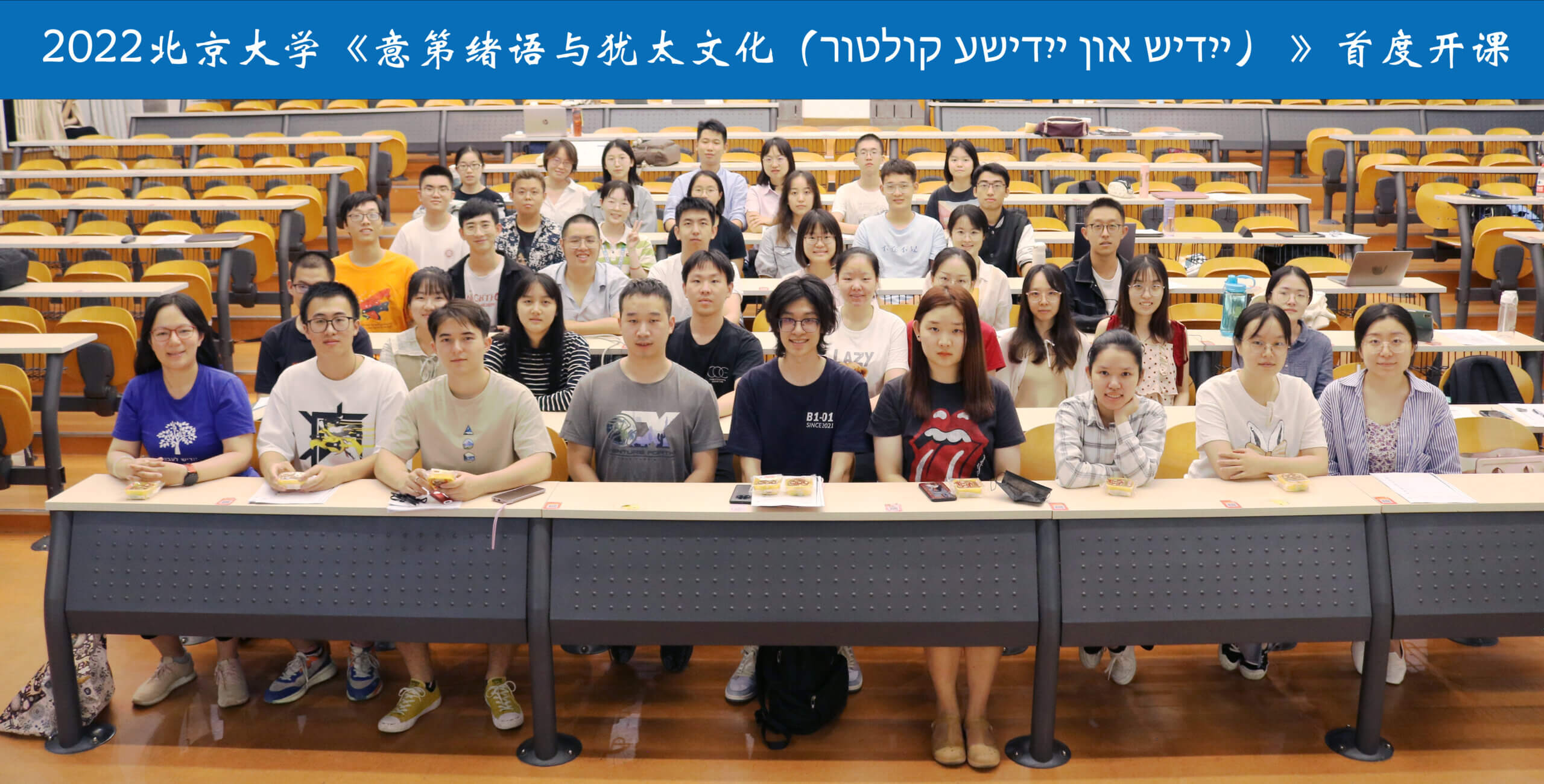At the Harvard of China, something brand nu — a class in Yiddish
At Peking University, students from a variety of majors are learning the alef-beys

Yang Meng’s Yiddish class at Peking University. Courtesy of Yang Meng
Over 30 students gathered for the first Yiddish class at Peking University in Beijing – and, according to its instructor, the first Yiddish class ever taught in China.
On the evening of Sept. 7, enrollees and auditors in majors ranging from psychology, space physics, engineering, law and mathematics, learned the alef-beys and the popular Yiddish song about learning it, “Afn Pripetshik.” Their instructor was Yang Meng, one of only a handful of Chinese academics fluent in the language. She’s also the first we know of to perform a Chinese-Yiddish song.
Yang learned Yiddish as part of her Ph.D. research on the Jewish exile in Shanghai during the Shoah. “Among the scholars of Jewish studies, I happened to know there was no mainland Chinese who spoke Yiddish at the time,” Yang said, “I thought why not give it a try!”
I spoke with Yang over email about how the class is going, the state of Jewish studies in China and why Chinese students may find common ground with Yiddish language and culture.
The following conversation has been lightly edited for length and clarity.
What would you say is the awareness of Yiddish in China? Is it distinct from the awareness of other modes of Jewish culture and languages?
The overwhelming majority of Chinese have no idea of Yiddish. Even in Peking University, the so-called Chinese Harvard, very few students or faculties ever heard about Yiddish. Some students came to my Yiddish class because they once were my students in my course “Jewish Civilization in a Global Context.”
Most Chinese have very little knowledge about Judaism because it is not part of the education in schools or in universities. Out of 200-plus students of my Jewish civilization course last semester, only five of them ever knew the word “Holocaust,” though they all knew this tragic event. Very few ever heard of Shabbat, let alone Yiddish.
From reading a piece in the Yiddish studies journal In geveb, I learned there is a Jewish studies program at Nanjing University as well. What is the state of the field of Jewish studies in China overall? And has it changed since you started?
Very few universities or academic institutions in China have Jewish studies programs, e.g., Nanjing University, Shandong University, Henan University, Shanghai Academy of Social Sciences, Heilongjiang Academy of Social Sciences, etc. Other universities only have one or two scholars who are doing related research or teaching. As in the city Beijing, where there are almost 100 universities or colleges, my Jewish civilization course is the only Jewish civilization course which is open university-wide.

Do you have people to speak Yiddish with in China? Apart from your class?
The only Yiddish-speaking couple I know in Beijing are the rabbi and his wife. So I am trying to make students understand that Yiddish is a key to Jewish culture. This was the Jewish language in the prewar Jewish world, this was the language that has influenced American English and the culture that made an impact on American society after the war, this is the language which today Holocaust survivors speak and the Orthodox community worldwide speak.
Is there anything about Yiddish — either as a language, or in the culture or stories surrounding it — that you feel Chinese students are likely to recognize in their own backgrounds and culture?
As Shanghainese is my mother tongue, I have more feelings for different languages/dialects. Today Shanghainese is also facing a similar situation as Yiddish is and even worse, as there was no such rich literature of Shanghainese as there was in Yiddish. Shanghainese has its unique flavor and it should not just disappear. There are already efforts to revive Shanghainese in Shanghai, e.g., courses on Shanghainese in school in Shanghai. Students coming from all parts of China have dialects from their hometown (their shtetl), and they might sense the meaning of a local language which is closely attached to its people.
Last semester I organized two screenings: “Menashe” and “Unorthodox” and I guided the Chinese students to understand the language and culture in the films. This semester I plan to screen films from Woody Allen and the series “Shtisel.”
Do you think you’ll get the chance to teach Yiddish next semester as well?
Next semester I will lead a seminar on “World Jewish Literature and Art.” I would love to open more on Jewish studies but it is not easy to get approved. I have tried, fought, insisted, persisted. My colleague Professor Zhao Baisheng wrote a very supportive letter for my Yiddish course and finally my Yiddish course got approved after repeated failures. I am very grateful to the Kehillat Beijing and Kehillat Shanghai. Both Jewish communities in China have offered me a lot of help and support on my teaching and I firmly believe it is very meaningful to promote Jewish studies in China and let both Chinese and Jewish civilizations find their ways to know each other.

A message from our Publisher & CEO Rachel Fishman Feddersen

I hope you appreciated this article. Before you go, I’d like to ask you to please support the Forward’s award-winning, nonprofit journalism so that we can be prepared for whatever news 2025 brings.
At a time when other newsrooms are closing or cutting back, the Forward has removed its paywall and invested additional resources to report on the ground from Israel and around the U.S. on the impact of the war, rising antisemitism and polarized discourse.
Readers like you make it all possible. Support our work by becoming a Forward Member and connect with our journalism and your community.
— Rachel Fishman Feddersen, Publisher and CEO






























